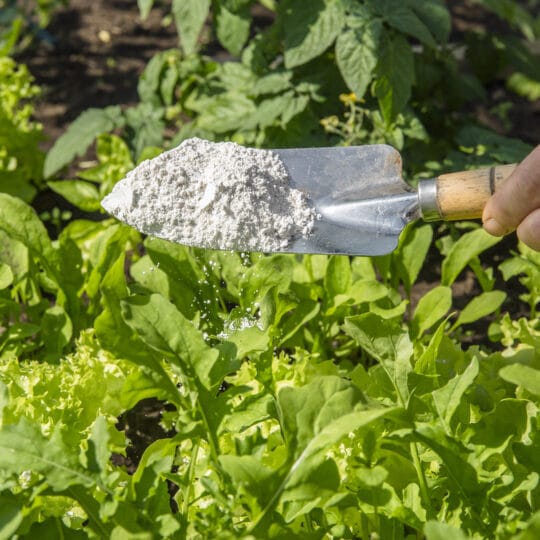Diatomaceous Earth’s Key Role in Successful Growing
Grow Healthy Plants the Natural Way

Previously, silicon dioxide was known by growers as an important part of soil or soilless media mixes to help plants grow healthier, but it was not recognized by the Association of American Plant Food Control Officials (AAPFCO) as an important substance. Recently, AAPFCO acknowledged silicon dioxide as a Beneficial Substance and subsequently published an approved method for testing soluble silicon. The organization identified that it’s important for growers to focus not on products with high SiO2 content, but that plant available or soluble silicon content is key. Today, we’re reviewing the importance of plant-available silica and how diatomaceous earth plays a role in the success of your growing.
The Importance of Plant Available Silica
Plant Available Silica (PAS) is translocated to the plant’s cell wall through the roots of a plant. It is known to improve structural integrity to help combat abiotic and biotic plant stressors including:
- Abiotic stressors
- Drought
- Waterlogging
Sources of Plant Available Silica
Sources of Silicon-rich minerals are abundantly available, yet researchers have found it’s the type of silicon that is converted into the plant available form that counts most. One of the most important things to know when choosing your silica source is that not all products containing silicon provide plant-available silica. For example, sand, pumice, perlite, vermiculite, and rockwool are technically silicon materials, but the silicon is hardly available to plants and they won’t offer health benefits.
There isn’t a single way to determine the best soil mix for plant health and crop production. For this reason, it’s important to look at the right fertilizer and substance ingredients for plant health while keeping an eye on secondary effects such as irrigation, plant disease, and aeration. Some sources of plant available silica include:
- Standard soil: The total elemental analysis of typical mineral soil is about 28% silicon and 47% oxygen. The majority of this silicon is bonded with oxygen and other elements in the crystalline fabric of mineral soil.
- Slag: Slag is a by-product from the industrial processing of iron and other alloys and can be used as a source of plant available silica. While typically a combination of silicon dioxide and metal oxides, sometimes it contains metal sulfides and other metals depending on the refining process that can be toxic to your plants.
- Diatomaceous Earth: Diatomaceous earth, also known as diatomite and DE, is the naturally occurring fossilized remains of diatoms—single-celled aquatic algae. It is a near-pure sedimentary deposit consisting almost entirely of silica.
Diatomaceous Earth as a Source of Plant Available Silica
Diatomaceous earth contains amorphous silicon dioxide, which has micronutrients that can be absorbed in the root system and translocate into the cell wall. The silica content of diatomaceous earth is absorbed into plant tissue and helps improve plant structure. It may also contain micronutrients such as Ca, Mg, or Fe, which can be absorbed by the plant’s root system and translocated to the cell wall.
Other Horticultural Benefits of Diatomaceous Earth
- Moisture retention: Diatomaceous earth improves the retention of moisture in potting mix, soil, and sandy soil by holding a greater amount of fluid and drying at a slower rate. The addition of diatomaceous earth to soil can increase drought resistance, which is particularly beneficial when added to the sand of golf putting greens.
- ph Buffer – diatomaceous earth provides a level of buffering capacity to maintain an optimal root-zone pH.
For decades, Dicalite Management Group has been serving the horticultural industry with our multi-mineral offering of diatomaceous earth, perlite, and vermiculite to help soil blenders and commercial growers grow bigger and better plants. Our team of engineers, operations personnel, and agronomists have utilized these very minerals to develop a patent-pending, 3-in-1 soil amendment offered by our first-ever direct-to-consumer brand Harvest Hero.
Choose Dicalite Management Group for Natural Diatomaceous Earth
Harvest Hero Enhanced Perlite Mix includes diatomaceous earth and is a great solution for home and commercial growers alike who want the support of a perfectly portioned mix—no guesswork! For bulk purchasing for your horticultural needs, we recommend exploring the many grades of diatomaceous earth offered by Dicalite. With an unequaled number of geographically dispersed processing sites and large ore reserves, we are the most vertically integrated supplier in our industry. This enables us to provide better, faster service for our customers.
Join Our Mailing List
Our blog offers insight and information about new and exciting uses for perlite, diatomaceous earth, and vermiculite deriving from years of research and application. From passive fire resistance to mineral depth filtration, by subscribing to our mailing list, you will receive the latest information surrounding the Dicalite, Dicaperl, and Specialty Vermiculite brands and products.